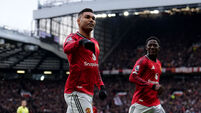Football: Fanfare plus business
His new offering is yet another must-read. The Football Men is a collection of profiles of footballers and managers.
“I’ve been doing this for 25 years, so it’s everyone from David Beckham to Jorge Valdano,” says Kuper, “Everyone from Anthony Minghella to Lionel Messi.














